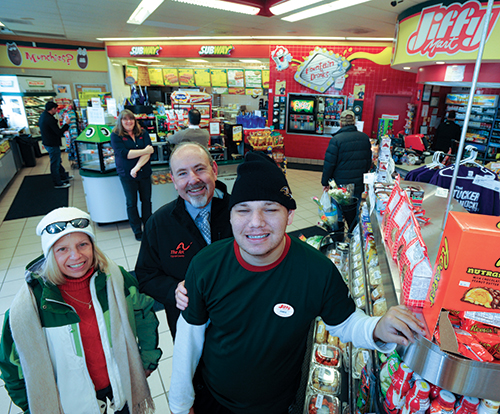
James Fanwell III is employed at the Westminster Jiffy Mart. He’s pictured with his job coach Theresa Maier and executive director of The Arc of Carroll County, Don Rowe.
Written By Barbara Pash, Photos by: Phil Grout
Buttersburg Inn, a restaurant in Union Bridge, is one.
So is McDaniel College, in Westminster. The New Spider Web, a silk screening and printing shop in Westminster, is a third. And these are just the places Jim Mayola can think of off the top of his head.
Mayola is a job developer for CHANGE Inc., a Westminster-based vocational center and training site for the developmentally disabled.
Mayola is responsible for finding employment for CHANGE’s clients – admittedly a challenge, but one made easier by the attitude he often encounters among Carroll County’s businesses, services and institutions.
“For the most part, employers have been willing to give our clients a chance,” says Mayola, who, on his end, tries to fit the client to the job and to provide training for successful employment.
Don Rowe, executive director of The Arc of Carroll County, for people with developmental disabilities in Westminster, agrees. “This Carroll County community has done a great job in hiring the disabled,” said Rowe. Even so, he adds, “we have more clients than there are jobs.”
State and federal tax programs and on-the-job training funds are available for employers who hire disabled workers. A national program offers tax credits to employers who hire qualified disabled veterans. Still, these do not appear to be the main motivation.
Both Mayola and Rowe have heard employers genuinely express the desire to “do good” or “do the right thing.” Employers are also looking for “a stable employee, someone who will show up every day and be motivated,” says Rowe.
All of Mayola’s clients get Social Security disability payments, which restricts the amount of time they can work, a variable figure, but usually a maximum of 20 hours per week. The clients also usually depend on public transportation that, in Carroll County, is a bus service with limited hours.
Since his clients can’t work eight-hour days, Mayola takes a unique approach with employers. He calls it “job carving,” meaning that he asks employers what kinds of work they have that is not getting done.
“I’m looking for something they may not have thought of before as a job – a piece of a routine that is not big enough to hire a part-time worker but too big to be ignored,” he said, “like sending returned merchandise back to the manufacturer.”
Once a job is secured, both CHANGE and The Arc do everything they can to make the relationship between employer and employee successful.
Rowe has been asked by employers, particularly if they have never hired a person with a disability before, to conduct informal sensitivity training with the other workers. “It may be a new experience for that workplace,” he said.
Mayola points to the New Spider Web as a success story.
Sharon Bell is owner and president of the Westminster shop that does silk screening and textile printing, embroidery, banners, vehicle lettering and small signs for the wholesale and retail markets. When Mayola approached her about hiring a worker with a disability, Bell resisted.
“I was reluctant, I was skeptical,” said Bell. “I had hired a disabled worker several years ago and it hadn’t worked out. I felt bad.”
Then Mayola introduced her to Jordan Ketterman, a client in his mid-20s, and Bell took a chance. Ketterman has worked mornings at the shop for a year now, and things have turned out better than anyone expected. Originally hired to clean the shop and the screens, he did so well that Bell increased his job responsibilities.
Bell has eight full-time employees, and she had some concerns about introducing some of them into the workplace. She wasn’t worried that they would be prejudiced against people with disabilities but, rather, “they are very busy and I didn’t want them to worry that they would get hurt,” she said.
Her concerns quickly disappeared. “They joke with Ketterman, they kid around with him,” said Bell, who does not receive any tax breaks or subsidies for employing Ketterman. “If you ask him to do something, he does it with a smile on his face. He’s always happy, and that lifts everyone’s spirits.”
Leigh Sauter is director of marketing and development at Goodwill Industries of Monocacy Valley Inc., the territory includes Carroll County.
Goodwill has a workforce development program in Westminster. Individuals with disabilities are referred to Goodwill, which identifies skills and interests and creates a personalized employment plan.
Goodwill case managers are assigned to seek out jobs in the community. Goodwill recently created the position of business developer to coordinate with businesses in Carroll County.
“Part of our mission is to find work and to hire the disabled in our retail stores and in the community,” said Sauter. “Our retail jobs serve as a training program for the disabled.”
At Target Community and Educational Services, a private nonprofit in Westminster, Todd Bonney’s experience reflects that of others in the disability community. Bonney, manager of employment services, has 50 to 65 clients employed at any given time.
Employers range from Carroll Hospital Center to Jiffy Mart gas stations and convenience shops, from Target stores to Koons Westminster Toyota and Burger King in Hampstead.
“The key word is relationship,” says Bonney. “Even if I can’t get a hire right away, I maintain a relationship. A lot of employers are familiar with our services, so they are receptive.”

